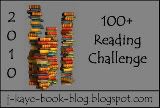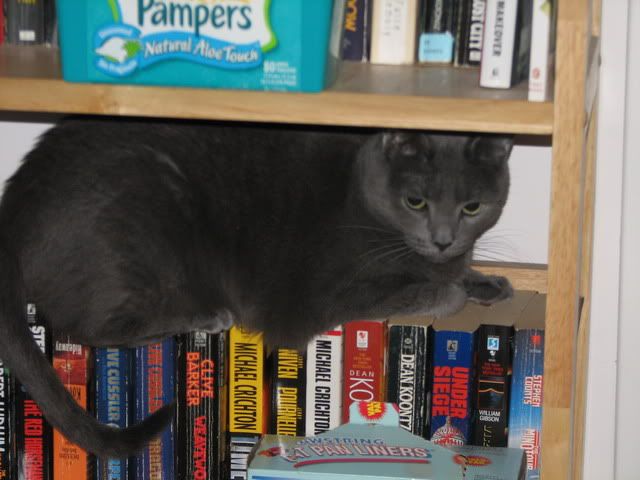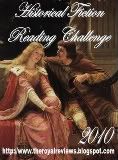I saw a high school's production of the play Les Misérables and decided I wanted to read it as one of my classics in the 2010 Mixology challenge. My son happened to have an abridged copy and I began reading it in the beginning of the month. It is truly a big book.
One problem (or not) that I had with this particular edited version is that several sections of Les Misérables was left out. The editor had notes which described certain portions of the text that had been deleted and in other places, merely stated that such-and-such part or chapter had been left out. At times I didn't understand exactly what was going on and wondered if everything would have been explained by the missing material. On the other hand, I tend to get bored with preachy or dry facts and will skip over it or not absorb it anyway.
Les Miserables is not just one character's story as I originally believed. It's the stories of several. The main one revolves around Jean Valjean, though, a very tragic sort of guy. As a young man, he steals a loaf of bread to feed his widowed sister's children, is caught and sent to prison for years. He makes two attempts at escape and has more years tacked on. After he's released, he eventually changes and becomes a "good" man but just can't escape that past.
There's a dedicated fanatical police inspector, Javert, who will never give up the hunt and is like one of those crazy dogs that attaches itself to someone's ankle and would rather die than let go.
There's little Cosette rescued from human-demons who were fostering her by Jean Valjean, at the age of 8.
There's her very tragic mother, Fantine.
The first half of the book was great! I thought it was one of the best books I'd ever read.
In the second half, though, the focus of the story shifted to a love story between Cosette and Marius.
I thought I might like Marius at first, a poor young lawyer who'd defied his rich grandfather and gone out into the world on his own. Marius began to develop as an independently thinking human being. One day he's going for his usual walk when he sees and falls in love with the beautiful Cosette, also on a walk with her own father. Cosette also notices Marius and falls right back in love with him.
One night, though, he becomes involved in trying to rescue Jean-Valjean from the demon foster parents. It turns out demon foster father "rescued" Marius' father at the Battle of Waterloo. Actually, the father was being robbed but didn't realize it. Anyway, he's so grateful to the thief that at his death he charges Marius with doing anything possible to help this loser. When Marius realizes who this loser actually is, he freezes and I became thoroughly disgusted with him.
I'm leaving out the next important chunk of the story but that's only because I'm too lazy to go into it all and because I was so disgusted with Marius I just didn't enjoy the mini-revolution by a small band of martyrs.
This is one of the greatest stories ever written though. Seriously.
I'm also fitting this book into the "New Authors" challenge because I've never read anything by Victor Hugo before.



Sunday, June 27, 2010
Les Misérables by Victor Hugo
Posted by
Irishcoda
at
4:27 PM
0
comments
![]()
Labels: 100+ Reading Challenge, 2010 Historical Fiction Challenge, New Authors Challenge
Tuesday, June 1, 2010
Other books I read in May
I really fell behind, but not with my reading! I guess I didn't feel particularly motivated to write about the books...at least, not until this last one!
Here are the rest of the books I read this month:
Symtoms of Withdrawal by Christopher Kennedy Lawford: When I came across this book a couple of years ago, it triggered memories of my fascination with everything Kennedy. When I was a teenager, I went through a time where I read every book I could find on John and/or Robert Kennedy. I stopped when I began having nightmares about them. I was especially interested in Lawford's book because he's a member of the next, privileged generation that had nothing but problems. Lawford's a recovering addict--I don't think you're ever "cured" from alcoholism, drugs or the effects of a dysfunctional family. I think you're in recovery the rest of your life.
Anyway, Lawford details his early years before his famous parents' divorce, growing up with his Kennedy cousins and becoming involved with drugs, and hitting rock bottom. It takes longer to hit rock bottom when you have a lot of money and a famous family to protect you. Some of the family "rules" sounded very familiar--especially the "closed" system. "There's nothing wrong with our family and don't you dare talk about it anyway!"
Except for the fact that it's written by a member of the Kennedy family, the book's as good as any written by one who's experienced the hell of addiction.
Frankenstein: Prodigal Son by Dean Koontz. Prodigal Son is the first in a trilogy about the monster and his inventer, set in the present time. It's not a retelling so much as it is a continuation of the classic by Mary Shelley. Dr. Frankenstein, now Dr. Victor Helios, has remade himself into an immortal super-human and is creating a race of beings that are an improvement on his original monster. That man now calls himself Deucalion and is determined to stop the mad doctor. Deucalion is drawn to New Orleans because Helios has shown up there. By coincidence (or not) there are a pair of serial killers running around too and they are stealing body parts. Hmmm. Detectives Carson O'Connor and Michael Maddison are hunting for them. There's another sub-plot I could do without that involves O'Connor's autistic brother. I'm sure that storyline will become more prominent in the next book. I'd gotten bored with Dean Koontz stories because they seem to follow a predictable routine but since I hadn't read anything by him in over a year, this one was pretty good.
Healing the Child Within by Charles L. Whitfield, M.D.: I learned so much from this book! It seemed like I was bookmarking every other page. I think I'll save those bits for my recovery blog. The basic idea is that we all have inner children. The author gives this description of our inner children: "who we are when we feel most authentic, genuine or spirited." When that child is "out" we feel the most alive and happy. The thing is, most of us have had to hide the child and develop what the author calls a "co-dependent self" and that's a result of the way we've grown up. There are different degrees of dysfunction in the family and some causes are alcoholism, drug abuse, mental illness, perfectionism, and "coldness". The book also explores how to heal and release the inner child. I am really glad I read this book!
The books fit into these challenges:



Now that I've read Symptoms of Withdrawal, I've completed this challenge, yay!

Posted by
Irishcoda
at
6:09 PM
0
comments
![]()
Labels: 100+ Reading Challenge, 2010 Mixology, 2010 Wish I'd Read That Challenge, Books I've Read, Memorable Memoirs Challenge, New Authors Challenge







